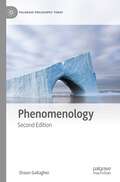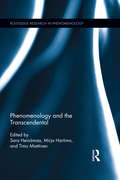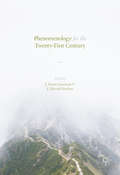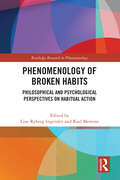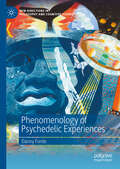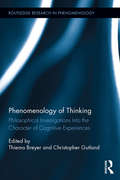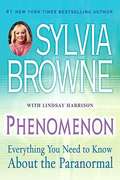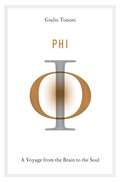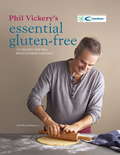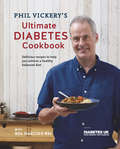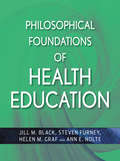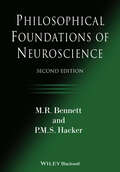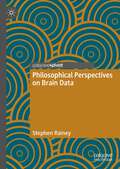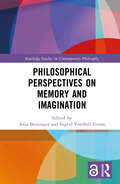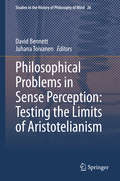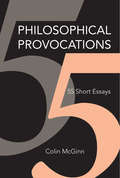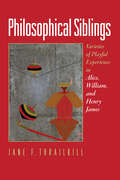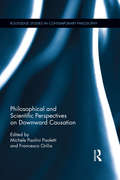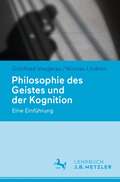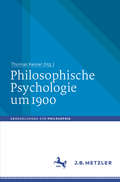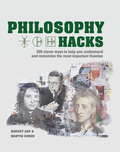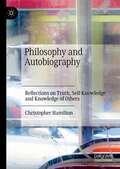- Table View
- List View
Phenomenology (Palgrave Philosophy Today)
by Shaun GallagherWith a focus on phenomenological methods, this new edition of Shaun Gallagher’s highly regarded textbook provides a comprehensive introduction to phenomenology considered as a philosophical and interdisciplinary practice. Phenomenology 2e encompasses both the classic 20th century explications of phenomenology as well as recent developments in the practical and scientific uses of phenomenology.Key features: Explores debates about naturalizing phenomenology and reviews recent extensions of phenomenological methodology. Relates the phenomenological analysis of intentionality to discussions of enactive perception. Includes a discussion of the phenomenology of performance and a new chapter on critical phenomenology. Examines specialized topics in phenomenology, including Husserl’s concept of hyletic data, embodiment, time-consciousness, action, intersubjectivity and self-consciousness. Each chapter concludes with suggestions for further reading. This book is essential reading for all undergraduate and graduate philosophy students taking courses in phenomenology. It is also ideal for use on cognitive science modules that incorporate a phenomenological perspective.
Phenomenology and the Transcendental (Routledge Research in Phenomenology)
by Mirja Hartimo Sara Heinämaa Timo MiettinenThe aim of this volume is to offer an updated account of the transcendental character of phenomenology. The main question concerns the sense and relevance of transcendental philosophy today: What can such philosophy contribute to contemporary inquiries and debates after the many reasoned attacks against its idealistic, aprioristic, absolutist and universalistic tendencies—voiced most vigorously by late 20th century postmodern thinkers—as well as attacks against its apparently circular arguments and suspicious metaphysics launched by many analytic philosophers? Contributors also aim to clarify the relations of transcendental phenomenology to other post-Kantian philosophies, most importantly to pragmatism and Wittgenstein’s philosophical investigations. Finally, the volume offers a set of reflections on the meaning of post-transcendental phenomenology.
Phenomenology for the Twenty-First Century
by J. Aaron Simmons and J. Edward HackettThis volume illustrates the relevance of phenomenology to a range of contemporary concerns. Displaying both the epistemological rigor of classical phenomenology and the empirical analysis of more recent versions, its chapters discuss a wide range of issues from justice and value to embodiment and affectivity. The authors draw on analytic, continental, and pragmatic resources to demonstrate how phenomenology is an important resource for questions of personal existence and social life. The book concludes by considering how the future of phenomenology relates to contemporary philosophy and related academic fields.
Phenomenology of Broken Habits: Philosophical and Psychological Perspectives on Habitual Action (Routledge Research in Phenomenology)
by Karl Mertens Line Ryberg IngerslevThis volume explores the phenomenology of broken habits and their affective, social, and involuntary dimensions. It shows how disruptive experiences impact self-understanding and social embeddedness.The chapters in this volume investigate the epistemic and existential relevance of breakdown of habits and the corresponding kinds of self-understanding available to the agent. The first part focuses on the double-sidedness of habitual life. On the one hand, habits allow us to arrange and navigate in a familiar home world; on the other hand, habits can take hold of us in such a way that we lose our sense of autonomy. The contributors argue that habitual agency is structurally carried by a dynamic that entails both freedom and necessity. As habits enable us to inhabit and thus acquire a world, they also affectively provide a texture and a background for our feeling at home in the world. The chapters in Part 2 focus on the breakdowns of our habitual social and technological life forms and the phenomenology of their affective texture. History and habitual learning are sedimented in our body memory and in our language, and these sedimented layers are partly out of our direct control. Part 3 focuses on the structural openness of habits in relating to one’s past and one’s traumatic experiences. Part 4 reflects on the ways in which we might become aware of and thus transform or appropriate our culturally given habits.Phenomenology of Broken Habits will appeal to researchers and advanced students working in phenomenology, philosophy of mind, and philosophy of psychology.
Phenomenology of Psychedelic Experiences (New Directions in Philosophy and Cognitive Science)
by Danny FordeThis book provides a phenomenological examination of the psychedelic experience. Danny Forde begins by introducing and outlining both the subject matter (psychedelics) and the approach (phenomenology). In the phenomenological analysis, Forde defends a bundle of four interconnected claims. The first thesis is that a minimal sense of self is maintained even during the most turbulent experiences of ego-dissolution. This leads into the second thesis, which argues that rather than being purely hallucinatory, the psychedelic experience can reveal aspects of reality which would not otherwise be disclosed, i.e., as the ego dissolves one gains a view of the world which Forde calls ego-free seeing. The third thesis is that the psychedelic experience can open the subject to the essential nature of reality. Here, Forde claims that the mythopoetic archetypical phenomena encountered during the peak of the psychedelic experience are best comprehended in terms of essences. Finally, Forde argues that the psychedelic experience is a bona fide transformative experience and offers a distinct way of apprehending the Ground of Being.
Phenomenology of Thinking: Philosophical Investigations into the Character of Cognitive Experiences (Routledge Research in Phenomenology #4)
by Thiemo Breyer Christopher GutlandThis book draws connections between recent advances in analytic philosophy of mind and insights from the rich phenomenological tradition concerning the nature of thinking. By combining both analytic and continental approaches, the volume arrives at a more comprehensive understanding of the mental process of "thinking" and the experience and manipulation of objects of thought. Contributors scrutinize aspects of thinking that have a common grounding in both the phenomenological and analytic tradition: perception, language, logic, embodiment and situatedness due to individual history or current experience. This collection serves to broaden and enrich the current debate over "cognitive phenomenology," and lays the foundations for further dialogue between analytic and continental approaches to the phenomenal character of thinking.
Phenomenon: Everything You Need to Know About the Paranormal
by Sylvia Browne Lindsay HarrisonIn this compelling new book, bestselling author Sylvia Browne offers her most comprehensive guide to the afterlife. Phenomenon is a fascinating compendium of all things on the Other Side that influence our life here on Earth. Sylvia Browne provides evocative stories and powerful explanations to help make life on the Other Side real for all of us. In Phenomenon, she provides reassuring answers to questions such as: Atlantis - Where did it go and when will it return? Clairvoyance - How do you know if you have the gift? Deja vu - Are past lives the answer to this strange phenomenon? Ghosts - What are they? Miracles - Can they happen every day? Reincarnation - Have we lived before? Sorcery - Is there something we should fear? Zombies - Are they only in horror movies? An easy-to-use reference full of hope and guidance, Phenomenon is sure to have wide appeal among Browne's loyal fans and anyone in search of signs of the paranormal.
Phi: A Voyage from the Brain to the Soul
by Giulio TononiThis title is printed in full color throughout.From one of the most original and influential neuroscientists at work today, here is an exploration of consciousness unlike any other--as told by Galileo, who opened the way for the objectivity of science and is now intent on making subjective experience a part of science as well. Galileo's journey has three parts, each with a different guide. In the first, accompanied by a scientist who resembles Francis Crick, he learns why certain parts of the brain are important and not others, and why consciousness fades with sleep. In the second part, when his companion seems to be named Alturi (Galileo is hard of hearing; his companion's name is actually Alan Turing), he sees how the facts assembled in the first part can be unified and understood through a scientific theory--a theory that links consciousness to the notion of integrated information (also known as phi). In the third part, accompanied by a bearded man who can only be Charles Darwin, he meditates on how consciousness is an evolving, developing, ever-deepening awareness of ourselves in history and culture--that it is everything we have and everything we are. Not since Gödel, Escher, Bach has there been a book that interweaves science, art, and the imagination with such originality. This beautiful and arresting narrative will transform the way we think of ourselves and the world.
Phil Vickery's Essential Gluten Free
by Phil VickerySince Phil Vickery published his first gluten-free book in 2009, the number of people opting to go gluten-free has risen dramatically - 13% of the UK population now say they avoid gluten; in Finland the number of coeliacs has more than doubled in 20 years and in Italy it has doubled since 2007. A notoriously restrictive diet, it can seem the end of exciting food, but Phil uses his Michelin-starred cooking talents and simple, honest ingredients to create dishes that everyone in the family can eat - including the pizza, bread, pasta, cakes and biscuits that you thought you would never enjoy again. The 175 delicious recipes take their inspiration from cuisines around the world and range from Lasagnette with Asparagus and Tomatoes to Easy Pad Thai Noodles and American-style Pancakes with Pears and Almonds.
Phil Vickery's Essential Gluten Free
by Phil VickerySince Phil Vickery published his first gluten-free book in 2009, the number of people opting to go gluten-free has risen dramatically - 13% of the UK population now say they avoid gluten; in Finland the number of coeliacs has more than doubled in 20 years and in Italy it has doubled since 2007. A notoriously restrictive diet, it can seem the end of exciting food, but Phil uses his Michelin-starred cooking talents and simple, honest ingredients to create dishes that everyone in the family can eat - including the pizza, bread, pasta, cakes and biscuits that you thought you would never enjoy again. The 175 delicious recipes take their inspiration from cuisines around the world and range from Lasagnette with Asparagus and Tomatoes to Easy Pad Thai Noodles and American-style Pancakes with Pears and Almonds.
Phil Vickery's Ultimate Diabetes Cookbook: Delicipis Recipes To Help You Achieve A Healthy Balanced Dite
by Phil VickeryWinner - Gourmand World Cookbook Awards: Best World Gourmand Cookbook Health and Nutrition 2017 Being diagnosed with Type 2 Diabetes needn't mean an end to enjoying food. In his bestselling gluten-free cookbooks, Phil Vickery showed it's possible to overcome dietary restrictions and still eat well. Now he's turned his attention to creating recipes that will help diabetics take control of their diet and lower their blood sugar levels, with the endorsement of Diabetes UK. Organised into Breakfasts, Light Bites, Soup & Lunch, Main Meals, Sweet Things & Drinks and Sides & Dressings, the recipes are accompanied by nutritional analysis and at-a-glance `traffic light' labelling. They include delicious dishes such as Squash, Feta & Hazelnut Salad and Roast Butterfly Chicken with Pomegranate, Lemon, Garlic & Mint, and cakes and desserts such as Banana Pinenut Cake and Easy Chocolate Mousse. With advice on achieving (and maintaining) a healthy weight, practical tips on eating less refined carbohydrates, smaller portions, and nutrient dense ingredients, Phil makes eating sensibly easier and more appealing than ever.
Phil Vickery's Ultimate Diabetes Cookbook: Supported by Diabetes UK
by Phil VickeryWinner - Gourmand World Cookbook Awards: Best World Gourmand Cookbook Health and Nutrition 2017 Being diagnosed with Type 2 Diabetes needn't mean an end to enjoying food. In his bestselling gluten-free cookbooks, Phil Vickery showed it's possible to overcome dietary restrictions and still eat well. Now he's turned his attention to creating recipes that will help diabetics take control of their diet and lower their blood sugar levels, with the endorsement of Diabetes UK. Organised into Breakfasts, Light Bites, Soup & Lunch, Main Meals, Sweet Things & Drinks and Sides & Dressings, the recipes are accompanied by nutritional analysis and at-a-glance `traffic light' labelling. They include delicious dishes such as Squash, Feta & Hazelnut Salad and Roast Butterfly Chicken with Pomegranate, Lemon, Garlic & Mint, and cakes and desserts such as Banana Pinenut Cake and Easy Chocolate Mousse. With advice on achieving (and maintaining) a healthy weight, practical tips on eating less refined carbohydrates, smaller portions, and nutrient dense ingredients, Phil makes eating sensibly easier and more appealing than ever.
Philosophical Foundations of Education (9th Edition)
by Howard A. OzmanNow in its ninth edition, Philosophical Foundations of Education provides readers with comprehensive knowledge about the various schools of thought that have comprised the philosophy of education throughout history. Highly readable, this chronological text gives insight into the individuals who helped develop various philosophies of education and provides historical information about how they lived and how they learned. In addition, each chapter covers each philosophy’s aims, methods, curriculums, teaching roles, advantages, and disadvantages. Covering not only how each philosophy evolved over time but also how these philosophies influenced subsequent educational practice, this popular textbook also challenges readers to apply what they have learned in their own profession and develop their own philosophies about education, instruction, and schooling.
Philosophical Foundations of Neuroscience
by P. M. Hacker M. R. BennettThe second edition of the seminal work in the field—revised, updated, and extended In Philosophical Foundations of Neuroscience, M.R. Bennett and P.M.S. Hacker outline and address the conceptual confusions encountered in various neuroscientific and psychological theories. The result of a collaboration between an esteemed philosopher and a distinguished neuroscientist, this remarkable volume presents an interdisciplinary critique of many of the neuroscientific and psychological foundations of modern cognitive neuroscience. The authors point out conceptual entanglements in a broad range of major neuroscientific and psychological theories—including those of such neuroscientists as Blakemore, Crick, Damasio, Dehaene, Edelman, Gazzaniga, Kandel, Kosslyn, LeDoux, Libet, Penrose, Posner, Raichle and Tononi, as well as psychologists such as Baar, Frith, Glynn, Gregory, William James, Weiskrantz, and biologists such as Dawkins, Humphreys, and Young. Confusions arising from the work of philosophers such as Dennett, Chalmers, Churchland, Nagel and Searle are subjected to detailed criticism. These criticisms are complemented by constructive analyses of the major cognitive, cogitative, emotional and volitional attributes that lie at the heart of cognitive neuroscientific research. Now in its second edition, this groundbreaking work has been exhaustively revised and updated to address current issues and critiques. New discussions offer insight into functional magnetic resonance imaging (fMRI), the notions of information and representation, conflict monitoring and the executive, minimal states of consciousness, integrated information theory and global workspace theory. The authors also reply to criticisms of the fundamental arguments posed in the first edition, defending their conclusions regarding mereological fallacy, the necessity of distinguishing between empirical and conceptual questions, the mind-body problem, and more. Essential as both a comprehensive reference work and as an up-to-date critical review of cognitive neuroscience, this landmark volume: Provides a scientifically and philosophically informed survey of the conceptual problems in a wide variety of neuroscientific theories Offers a clear and accessible presentation of the subject, minimizing the use of complex philosophical and scientific jargon Discusses how the ways the brain relates to the mind affect the intelligibility of neuroscientific research Includes fresh insights on mind-body and mind-brain relations, and on the relation between the notion of person and human being Features more than 100 new pages and a wealth of additional diagrams, charts, and tables Continuing to challenge and educate readers like no other book on the subject, the second edition of Philosophical Foundations of Neuroscience is required reading not only for neuroscientists, psychologists, and philosophers, but also for academics, researchers, and students involved in the study of the mind and consciousness.
Philosophical Perspectives on Brain Data
by Stephen RaineyWhere there is data there are questions of ownership, leaks, and worries about misuse. When what’s at stake is data on our brains, the stakes are high. This book brings together philosophical analysis and neuroscientific insights to develop an account of ‘brain data’: what it is, how it is used, and how we ought to take care of it. Emerging trends in neuroscience appear to make mental activity legible, through sophisticated processing of signals recorded from the brain. This can include Artificial Intelligence (AI), with algorithms classifying brain signals for further processing. These developments will have ramifications for concepts of the brain, the self, and the mind. They will also affect clinical practices like psychiatry, by modifying concepts of mental health and introducing AI-based diagnostic and treatment strategies. The issues arising are vastly complicated, little understood, but of high importance. Philosophical Perspectives on Brain Data clarifies complex intersections of philosophical and neuroscientific interest, presenting an account of brain data that is comprehensible. This account can be the basis for evaluating practices based on brain data. As such, the book aims to open a novel space for evaluating hitherto arcane areas of academic research in order to provide the necessary scope for understanding their real-world consequences. These consequences will include personal, socio-political, and public health dimensions. It is therefore vital that they are understood if their impacts upon aspects of everyday life can be evaluated adequately.
Philosophical Perspectives on Memory and Imagination (Routledge Studies in Contemporary Philosophy)
by Anja Berninger Íngrid Vendrell FerranThis book explores the structure and function of memory and imagination, as well as the relation and interaction between the two states. It is the first book to offer an integrative approach to these two emerging areas of philosophical research. The essays in this volume deal with a variety of forms of imagining and remembering. The contributors come from a range of methodological backgrounds: empirically minded philosophers, analytic philosophers engaging mainly in conceptual analysis, and philosophers informed by the phenomenological tradition. Part 1 consists of novel contributions to ontological issues regarding the nature of memory and imagination and their respective structural features. Part 2 focuses on questions of justification and perspective regarding both states. The chapters in Part 3 discuss issues regarding memory and imagination as skills or abilities. Finally, Part 4 focuses on the relation between memory, imagination, and emotion. Philosophical Perspectives on Memory and Imagination will be of interest to scholars and advanced students working in philosophy of memory, philosophy of imagination, philosophy of mind, and epistemology.
Philosophical Problems in Sense Perception: Testing the Limits of Aristotelianism (Studies in the History of Philosophy of Mind #26)
by David Bennett Juhana ToivanenThis volume focuses on philosophical problems concerning sense perception in the history of philosophy. It consists of thirteen essays that analyse the philosophical tradition originating in Aristotle’s writings. Each essay tackles a particular problem that tests the limits of Aristotle’s theory of perception and develops it in new directions. The problems discussed range from simultaneous perception to causality in perception, from the representational nature of sense-objects to the role of conscious attention, and from the physical/mental divide to perception as quasi-rational judgement. The volume gives an equal footing to Greek, Arabic, and Latin philosophical traditions. It makes a substantial contribution not just to the study of the Aristotelian analysis of sense perception, but to its reception in the commentary tradition and beyond. Thus, the papers address developments in Alexander of Aphrodisias, Themistius, Avicenna, John of Jandun, Nicole Oresme, and Sayf al-Din al-Amidi, among others. The result of this is a coherent collection that attacks a well-defined topic from a wide range of perspectives and across philosophical traditions.
Philosophical Provocations: 55 Short Essays
by Colin McGinnPithy, direct, and bold: essays that propose new ways to think about old problems, spanning a range of philosophical topics. In Philosophical Provocations, Colin McGinn offers a series of short, sharp essays that take on philosophical problems ranging from the concept of mind to paradox, altruism, and the relation between God and the Devil. Avoiding the usual scholarly apparatus and embracing a blunt pithiness, McGinn aims to achieve as much as possible in as short a space as possible while covering as many topics as possible. Much academic philosophical writing today is long, leaden, citation heavy, dense with qualifications, and painful to read. The essays in Philosophical Provocations are short, direct, and engaging, often challenging philosophical orthodoxy as they consider issues in mind, language, knowledge, metaphysics, biology, ethics, and religion. McGinn is looking for new ways to think about old problems. Thus he writes, about consciousness, “I think we have been all wrong,” and goes on to suggest that both consciousness and the unconscious are mysteries. Summing up his proposal on altruism, he remarks, “My suggestion can now be stated, somewhat brutally, as follows: human altruism is the result of parasitic manipulation.” He takes a moment to reflect: “I really don't know why it is good to be alive, though I am convinced that the standard suggestions don't work.” McGinn gets straight to the point and states his position with maximum clarity. These essays offer provocative invitations to think again.
Philosophical Siblings: Varieties of Playful Experience in Alice, William, and Henry James
by Jane F. ThrailkillAlice James: an exemplary nineteenth-century neurasthenic and diarist. William James: a foundational figure for American psychology and philosophy. Henry James: a preeminent author and literary critic. These three iconic figures of nineteenth-century American culture and letters were also siblings, children of the storied James family, yet the diarist, the psychologist, and the novelist have seemed to occupy distinct realms of cultural authority and to speak to different audiences (or, in the case of Alice, to no audience at all). Their writings have rarely been considered together.In Philosophical Siblings Jane F. Thrailkill asks what new story is illuminated when we study their writings collectively. By approaching the Jameses as intimate thinkers operating on a common field of play, Thrailkill reveals the siblings' shared project—part psychological, part philosophical—of showing how minds meet in a world teeming with possibilities and risks. Scientists in nineteenth-century psychology labs were studying isolated individuals, tracking eye movements, and timing reactions to better understand the human machine. In contrast, the Jameses' models for discovery were philosophical toys: ludic devices that light up quirks of perception and are devilishly fun as well. With childlike humor, the siblings' intellectual playfulness is both message and medium, manifested in an expressive style that exploits incongruity, delights in absurdities, and sometimes, teasingly, inflicts the sting of critique.Most important, the Jameses' writings model how human beings accomplish high-wire acts of perception and creation. Alice, William, and Henry James did not merely present a new, interactive theory of mind; they dramatized it in their writings as a curiosity-based practice. Philosophical Siblings accepts their invitation to mindful play and offers a fresh way of thinking about literary encounters more generally, one that approaches even the weightiest texts with serious lightness.
Philosophical and Scientific Perspectives on Downward Causation (Routledge Studies in Contemporary Philosophy)
by Francesco Orilia Michele Paolini PaolettiDownward causation plays a fundamental role in many theories of metaphysics and philosophy of mind. It is strictly connected with many topics in philosophy, including but not limited to: emergence, mental causation, the nature of causation, the nature of causal powers and dispositions, laws of nature, and the possibility of ontological and epistemic reductions. Philosophical and Scientific Perspectives on Downward Causation brings together experts from different fields—including William Bechtel, Stewart Clark and Tom Lancaster, Carl Gillett, John Heil, Robin F. Hendry, Max Kistler, Stephen Mumford and Rani Lill Anjum —who delve into classic and unexplored lines of philosophical inquiry related to downward causation. It critically assesses the possibility of downward causation given different ontological assumptions and explores the connection between downward causation and the metaphysics of causation and dispositions. Finally, it presents different cases of downward causation in empirical fields such as physics, chemistry, biology and the neurosciences. This volume is both a useful introduction and a collection of original contributions on this fascinating and hotly debated philosophical topic.
Philosophie des Geistes und der Kognition: Eine Einführung
by Gottfried Vosgerau Nicolas LindnerWas ist der Geist und wie funktioniert er? Die Philosophie des Geistes hat sich im Laufe der zweiten Hälfte des 20. Jahrhunderts – neben der Erkenntnistheorie und der Metaphysik – zu einer der zentralen Subdisziplinen der Theoretischen Philosophie herausgebildet. Das Lehrbuch behandelt nicht nur die klassischen Themen der Philosophie des Geistes, sondern stellt auch die neuesten Entwicklungen in Grundzügen vor. Dazu gehören Diskussionen zum Verhältnis des Geistes zum Körper und zur Umwelt, das Verständnis Anderer, Emotionen sowie das Verhältnis von Denken und Sprache. In erster Linie richtet sich das Lehrbuch an Personen, die mit dem Philosophiestudium angefangen haben oder sich einfach einen Überblick über philosophische Fragen und Diskussionen rund um den Geist und unsere geistigen Fähigkeiten verschaffen wollen. – Mit Definitionen, Beispielen und Literaturhinweisen sowie übersichtlichen Zusammenfassungen zur Selbst-Überprüfung.
Philosophische Psychologie um 1900 (Abhandlungen zur Philosophie)
by Thomas KesselDieser Band stellt die eigentümlichen Mischungsverhältnisse natur- und geisteswissenschaftlicher Perspektiven im Feld der philosophischen Psychologien um 1900 ins Zentrum. Diese Konzeptionen, die den engen Rahmen des Psychologismus-Streites überschreiten und ihn gleichwohl kontextualisieren, werden durch Beiträge zu Franz Brentano, Wilhelm Dilthey, Carl Stumpf, Theodor Lipps, Wilhelm Wundt, Oswald Külpe, Edmund Husserl, Wilhelm Windelband, Paul Natorp und Nicolai Hartmann repräsentiert.
Philosophy Hacks (Hacks Ser.)
by Robert Arp Martin CohenDiscover the simple way to understand and remember the most groundbreaking concepts in 3,000 years of philosophical thought. Each idea is broken down into three stages: 1/ The helicopter view, which gives you an introduction to the idea, and some context around it. 2/ The shortcut, which gives you the core elements of the theory, along with a range of examples that everyone can understand. 3/ The hack, which is a one-liner designed to stick in your memory and give you an instant grasp of the concept.From Pascal's Wager to Kant's categorical imperative, and from Camus's Existential Nihilism to Arendt's Banality of Evil, there are 100 concepts explained. The perfect introduction to philosophy, this is a great new way to learn about the most important philosophical ideas and concepts in a way that makes them easy to recall even months after reading the book.
Philosophy Hacks (Hacks)
by Robert Arp Martin CohenDiscover the simple way to understand and remember the most groundbreaking concepts in 3,000 years of philosophical thought. Each idea is broken down into three stages: 1/ The helicopter view, which gives you an introduction to the idea, and some context around it. 2/ The shortcut, which gives you the core elements of the theory, along with a range of examples that everyone can understand. 3/ The hack, which is a one-liner designed to stick in your memory and give you an instant grasp of the concept.From Pascal's Wager to Kant's categorical imperative, and from Camus's Existential Nihilism to Arendt's Banality of Evil, there are 100 concepts explained. The perfect introduction to philosophy, this is a great new way to learn about the most important philosophical ideas and concepts in a way that makes them easy to recall even months after reading the book.
Philosophy and Autobiography: Reflections on Truth, Self-Knowledge and Knowledge of Others
by Christopher HamiltonThis book, taking its point of departure from Stanley Cavell’s claim that philosophy and autobiography are dimensions of each other, aims to explore some of the relations between these forms of reflection, first by seeking to develop an outline of a philosophy of autobiography, and then by exploring the issue from the side of five autobiographical works. Christopher Hamilton argues in the volume that there are good reasons for thinking that philosophical texts can be considered autobiographical, and then turns to discuss the autobiographies of Walter Benjamin, Peter Weiss, Jean-Paul Sartre, George Orwell, Edmund Gosse and Albert Camus. In discussing these works, Hamilton explores how they put into question certain received understandings of what philosophical texts suppose themselves to be doing, and also how they themselves constitute philosophical explorations of certain key issues, e.g. the self, death, religious and ethical consciousness, sensuality, the body. Throughout, there is an exploration of the ways in which autobiographies help us in thinking about self-knowledge and knowledge of others. A final chapter raises some issues concerning the fact that the five autobiographies discussed here are all texts dealing with childhood.
